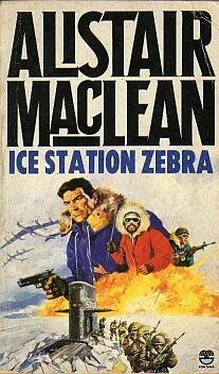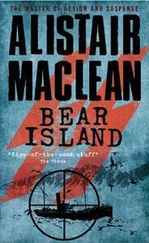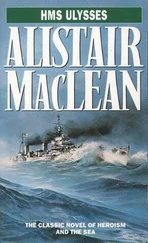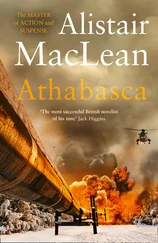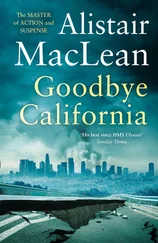"Zabrinski," he said unhesitatingly.
"Do you think you could pussy-foot along to wherever it is that he's sleeping and bring him here without waking up anyone?"
He didn't ask any questions. He said, "He can't walk, Doc, you know that."
"Carry him. You're big enough."
He grinned and left. He was back with Zabrinski inside three minutes. Three quarters of an hour later, after telling Rawlings he could call off his watch, I was back in my cabin.
Hansen was still asleep. He didn't wake even when I switched on a side light. Slowly, clumsily, painfully, I dressed myself in my furs, unlocked my case, and drew out the Mauser, the two rubber-covered magazines and the broken knife that Commander Swanson had found in the tractor's gas tank. I put them in my pocket and left. On my way through the control room, I told the officer on deck that I was going out to check on the two patients still left out in the camp. As I had pulled a fur mitten over my injured hand, he didn't raise an eyebrow, doctors were a law unto themselves, and I was just the good healer en route to give aid and comfort to the sick. -
I did have a good look at the two sick men, both of whom seemed to me to be picking up steadily, then said good night to the two «Dolphin» crewmen who were watching over them. But I didn't go straight back to the ship. First I went to the tractor shed and replaced the gun, magazines and broken knife in the tractor tank. Then I went back to the ship.
"I'm sorry to have to bother you with all these questions," I said pleasantly. "But that's the way it is with all government departments. A thousand questions in quadruplicate and each of them more pointlessly irritating than the rest. But I have this job to do and the report to be radioed off as soon as possible, and I would appreciate all the information and cooperation you can give me. First of all, has anyone any idea at all how this damned fire started?"
I hoped I sounded like a Ministry of Supply official, which was what I'd told them I was, making a Ministry of Supply report. I'd further told them, just to nip any eyebrow-raising in the bud, that it was the Ministry of Supply's policy to send a doctor to report on any accident where loss of life was involved. Maybe this was the case. I didn't know and I didn't care.
"Well, I was the first to discover the fire, I think," Naseby, the Zebra cook, said hesitantly. His Yorkshire accent was very pronounced. He was still no picture of health and strength, but, for all that, he was a hundred per cent improved on the man I had seen yesterday. Like the other eight survivors of Drift Ice Station Zebra who were present in the wardroom that morning, a long night's warm sleep and good food had brought about a remarkable change for the better. More accurately, like seven others. Captain Folsom's face had been so hideously burned that it was difficult to say what progress he was making, though he had certainly bad a good enough breakfast, almost entirely liquid, less than half an hour previously.
"It must have been about two o'clock in the morning," Naseby went on. "Well, near enough two. The place was already on fire. Burning like a torch, it was. I — "
"What place?" I interrupted. "Where were you sleeping?"
"In the cookhouse. That was also our dining hail. Furthestwest hut in the north row."
"You slept there alone?"
"No. Hewson, here, and Flanders and Bryce slept there also. Flanders and Bryce, they're-they were-lab technicians. Hewson and I slept at the very back of the hut, then there were two big cupboards, one on each side, that held all our food stores, then Flanders and Bryce slept in the dining hail itself, by a corner of the galley."
"They were nearest the door?"
"That's right. I got up, coughing and choking with smoke, very groggy, and I could see flames already starting to eat through the east wall of the hut. I shook Hewson, then ran for the fire extinguisher: it was kept by the door. It wouldn't work. Jammed solid with the cold, I suppose. I don't know. I ran back in again. I was blind by this time. You never saw smoke like it in your life. I shook Flanders and Bryce and shouted at them to get out; then I bumped into Hewson and told him to run and wake Captain Folsom here."
I looked at Hewson. "You woke Captain Folsom?"
"I went to wake him, but not right away. The whole camp was blazing like the biggest Fifth of November bonfire you ever saw, and flames twenty feet high were sweeping down the lane between the two rows of huts. The air was full of flying oil, a lot of it burning. I had to make a long swing to the north to get clear of the oil and the flames."
"The wind was from the east?"
"Not quite. Not that night. Southeast, I would say. Eastsoutheast would be more like it. Anyway, I gave a very wide berth to the generator house — that was the one next to the dining hall in the north row — and reached the main bunkhouse. That was the one you found us in."
"Then you woke Captain Folsom?"
"He was already gone. Shortly after I'd left the dining hall, the fuel drums in the fuel-storage hut — that was the one directly south of the main bunkhouse — started exploding. Like bloody great bombs going off, they were, the noise they made. They would have waked the dead. Anyway, they woke Captain Folsom. He and Jeremy here" — he nodded at a man sitting across the table from him — "had taken the fire extinguisher from the bunkhouse and tried to get close to Major Halliwell's hut."
"That was the one directly west of the fuel store?"
"That's right. It was an inferno. Captain Folsom's extinguisher worked well enough, but he couldn't get close enough to do any good. There was so much flying oil in the air that even the extinguisher foam seemed to burn."
"Hold on a minute," I said. "To get back to my original question. How did the fire start?"
"We've discussed that a hundred times among ourselves," Dr. Jolly said wearily. "The truth is, old boy, we haven't a clue. We know «where» it started, all right: match the huts destroyed against the wind direction that night and it could only have been in the fuel store. But how? It's anybody's guess. I don't see that it matters a great deal now."
"I disagree. It matters very much. If we could find out how it started, we might prevent another such tragedy later on. That's why I'm here. Hewson, you were in charge of the fuel store and generator hut. Have you no opinion on this?"
"None. It «must» have been electrical, but how I can't guess. It's possible that there was a leakage from one of the fuel drums and that oil vapor was present in the air. There were two black heaters in, the fuel store, designed to keep the temperature up to zero Fahrenheit so that the oil would always flow freely. Arcing across the make and break of the thermostats might have ignited the gas. But it's only a wild guess, of course.
"No possibility of any smoldering rags or cigarette butts being the cause?"
Hewson's face turned a dusky red. "Look, mister, I know my job. Burning rags, cigarette butts, I know how to keep a bloody fuel store — "
"Keep your shirt on," I interrupted. "No offense. I'm only doing «my» job." I turned back to Naseby. "After you'd sent Hewson to rouse Captain Folsom, what then?"
"I ran across to the radio room — that's the hut due south of the cookhouse and west of Major Halliwell's — "
"But those two lab technicians — Flanders and Bryce, wasn't it? — surely you made sure they were awake and out of it before you left the dining hail?"
"God help me, I didn't." Nasehy stared down at the deck, his shoulders hunched, his face bleak. "They're dead. It's my fault they're dead. But you don't know what it was like inside that dining hail. Flames were breaking through the east wall, the place was full of choking smoke and oil, I couldn't see, I could hardly breathe. I shook them both and shouted at them to get out. I shook them hard and I certainly shouted loud enough."
Читать дальше
Конец ознакомительного отрывка
Купить книгу
